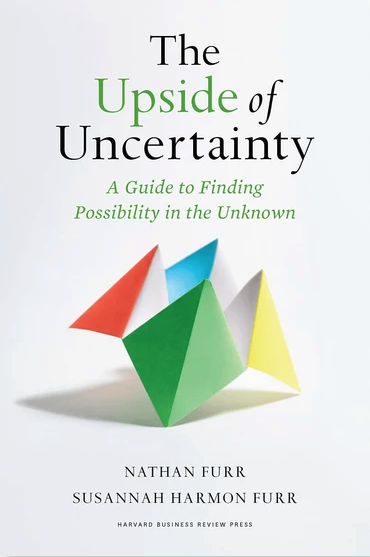In his quirky philosophical treatise, Finite and Infinite Games: A Vision of Life as Play and Possibility, New York University professor James Carse describes life as a game with two types of people: finite and infinite players. Finite players accept the roles life gives them (e.g., college student, manager, lawyer, parent, spouse) and play by the received rules in an effort to win. Infinite players play with the roles and bend the rules, not to win the game but for the joy of playing.
For finite players, uncertainty is the enemy because it creates unknowns about the ability to win. For infinite players, uncertainty is the realm of opportunity, and they play with the “expectation of being surprised!” As Carse argues, “To be prepared against surprise is to be trained. To be prepared for surprise is to be educated.” There are many ways to live as an infinite player.
Infinite players challenge their roles. Carse writes that we tend to identify ourselves by the roles we play in life, such as our job, relationships, or status (student, consultant, parent, etc.). But when we identify with a role, we are less likely to experiment with it because failure to “do it right” implies failure as a person. By contrast, if we view roles as temporary, changing and separate from who we really are, then we are more free to experiment, reinvent and transform them.

Infinite players also challenge the rules. Too many of us take the rules for granted without realizing they are made up. As filmmaker David Lynch describes it, “We think we understand the rules when we become adults, but what we really experience is a narrowing of the imagination.”
The most distinctive characteristic of Tesla CEO Elon Musk is his willingness to challenge the rules. “The one thing you can never do is tell Elon, ‘That’s the way things are done,’” said Sterling Anderson, former head of the Model X. Musk’s approach is to “boil things down to the most fundamental truths in a particular area, the things you’re really sure of are base truths, or highly sure of, and then you reason up from there.” For example, batteries have long been a bottleneck to affordable electric vehicles. Musk challenged the industry standard of $600 per kilowatt hour by breaking batteries down into raw components and demonstrating that the materials could be purchased on the London Metal Exchange for $80 per kilowatt hour.
Another way to challenge the rules is to rethink the way you interact with other players, even the competition. While at Cisco, Kate O’Keeffe observed that some of the most interesting and valuable opportunities happen at the boundaries between industries. She created the Cisco Hyperinnovation Living Lab, an outside-the-box forum to bring together uncommon partners like Visa, Nike, Costco and Lowe’s to find opportunities at their intersections, including reimagining the retail and supply chain. O’Keeffe reenvisioned the boundaries of the game, intuiting that competitors could work together to create new opportunities beyond the grasp of any individual company: “We are all each other’s customers and face common problems, so why not work together to create something more?”
Infinite players also challenge the game itself. Zach Klein, co-founder of Vimeo, recalls learning this lesson the hard way. “In the current cult of startup, it is a perfectly reasonable idea of success to start a company just to sell it very soon after for gobs of money,” he said. After Vimeo took off, Klein and his co-founders did exactly that, making a fortune. But today Klein laments, “As soon as I sold my company and I was standing safely on the ground, I wanted nothing more than to have those wings again. I just wanted to keep flying.”
Klein set out to look for others playing the game differently and came across Yvon Chouinard, founder of billion-dollar retail brand Patagonia. Chouinard, a self-described “dirtbag” climber who got his start selling rock-climbing equipment out of the back of his car, challenged the rules of business by treating his employees well, telling customers to repair their products rather than buy more, and donating 10% of profits or 1% of sales, whichever is greater, to grassroots change and sustainability efforts. Chouinard summarized his approach in his inspiring manifesto, Let My People Go Surfing: “I learned at a young age that it’s better to invent your own game, then you can always be the winner.”
Infinite players play for the sake of continuing the game and for discovering new surprises. Most importantly, infinite players are ready for uncertainty. David Hornik, a leading Silicon Valley venture capitalist who ranks on the Midas List of the world’s top investors, struggles with dyslexia. “Because I’m dyslexic, I always have uncertainty,” he says. “The world doesn’t make sense the way it does for everyone else.” Hornik learned to play the game differently while attending Harvard Law School. “Going to law school as a dyslexic was a dramatically stupid thing to do,” he told us, laughing. “If I had to read everything, I was dead.”
Instead, he says, “my goal in year one was to understand the game so I could play it my own way.” For example, rather than cram for an exam by forcing himself to read, he prewrote an essay based on the professor’s interest in philosopher John Rawls. When the professor handed out the exam—a paper on Rawls—Hornik simply handed in his prewritten essay. “I have to understand the system, because if I have to play by your rules I lose, but if I can play by my rules, I can do anything.” Hornik went on to earn high marks and become editor of the Harvard Law Review.
Infinite games might seem risky or counterintuitive to many, but Karen Arnold’s 14-year study of valedictorians reminds us that “college grades aren’t any more predictive of subsequent life success than rolling dice.” Why? “School has very clear rules… but life doesn’t. Life is messy,” she says. So challenge your roles, the rules, even the games you are playing, and create a life of continued play and new possibilities.
Reprinted by permission of Harvard Business Review Press. Excerpted from The Upside of Uncertainty: A Guide to Finding Possibility in the Unknown by Nathan Furr and Susannah Furr. Copyright 2022 Harvard Business Publishing Corporation. All rights reserved. Photo by @Anna_Ostanina/Twenty20





